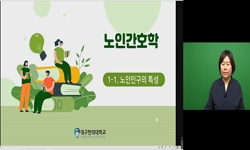Purpose This study was attempted to identify the impact of subjective health status, self-esteem, and depression on the quality of life of the older people in Korea. Methods The 15th Korean Welfare Panel data collected in 2020, the COVID-19 epidemic, ...
http://chineseinput.net/에서 pinyin(병음)방식으로 중국어를 변환할 수 있습니다.
변환된 중국어를 복사하여 사용하시면 됩니다.
- 中文 을 입력하시려면 zhongwen을 입력하시고 space를누르시면됩니다.
- 北京 을 입력하시려면 beijing을 입력하시고 space를 누르시면 됩니다.

노인의 주관적 건강상태, 자아존중감과 우울이 삶의 질에 미치는 영향 = The Impact of Health Status, Health Behavior, Self-Esteem and Depression on Quality of Life of Korean Older Adults
한글로보기https://www.riss.kr/link?id=A108711736
-
저자
김현주 (제주한라대학교)
- 발행기관
- 학술지명
- 권호사항
-
발행연도
2023
-
작성언어
Korean
-
주제어
노인 ; 주관적 건강 ; 자아존중감 ; 우울 ; 삶의 ; Older people ; Subjective health ; Self-esteem ; Depression ; Quality of Life
-
등재정보
KCI등재
-
자료형태
학술저널
-
수록면
189-201(13쪽)
- 제공처
-
0
상세조회 -
0
다운로드
부가정보
다국어 초록 (Multilingual Abstract)
Purpose This study was attempted to identify the impact of subjective health status, self-esteem, and depression on the quality of life of the older people in Korea. Methods The 15th Korean Welfare Panel data collected in 2020, the COVID-19 epidemic, were analyzed with SPSS Ver. 25.0 program. Descriptive statistical analysis, t-test, ANOVA, and multiple regression analysis were conducted using variables of gender, age, subjective health status, self-esteem, depression, and quality of life collected from the Korean Welfare Panel data. Result This study found that among general characteristics, there was a significant difference in quality of life according to age and gender. However, as a result of regression analysis, the regression equation of quality of life excluding gender and age was significant. Self-esteem, depression, and subjective health were found to affect the quality of life of older people, and the explanatory power of this model was 40.1%. Conclusion To improve the quality of life of older people, an approach that can increase their self-esteem and reduce depression is required.
국문 초록 (Abstract)
연구목적 본 연구는 한국 노인의 주관적 건강상태, 자아존중감, 우울이 삶의 질에 미치는 영향 을파악하여 노년기 삶의 질 향상을 위한 중재개발의 기초자료로 활용하고자 시도되었다. 연구...
연구목적 본 연구는 한국 노인의 주관적 건강상태, 자아존중감, 우울이 삶의 질에 미치는 영향 을파악하여 노년기 삶의 질 향상을 위한 중재개발의 기초자료로 활용하고자 시도되었다. 연구방법 코로나19 유행시기인 2020년에 수집된 15차 한국복지 패널자료를 활용하여, 전국 6,029가구의 패널자료중 65세 이상 노인 4,662명의 자료를 SPSS Ver. 25.0 프로그램을 이용하여 복합표본분석을 실시하였다. 한국복지패널자료에서 수집된 성별, 연령, 주관적 건강상태, 자아존중감, 우울, 삶의질 변수를활용하여 기술통계분석과, t-test, ANOVA, 복합표본 회귀분석을 실시하였다. 결과 일반적 특성 중연령과 성별에 따른 삶의 질 차이는 유의하였으나, 회귀분석결과 성별과 연령을 제외한 회귀식이 유의하였으며, 자아존중감, 우울, 주관적 건강이 노인의 삶의 질에 영향 미치는 것으로 나타났으며, 이모형의 설명력은 40.1%로 나타났다. 결론 노인의 삶의 질을 향상시키기 위한 정책적 노력으로 노인의 자아존중감을 높일 수 있는 접근이 요구되며, 노인의 우울을 감소시키기 위한 적극적 중재가 요구된다.
동일학술지(권/호) 다른 논문
-
올림픽 유산(Legacy)에 대한 개최지 주민의 인식: 2018평창동계올림픽을 중심으로
- 한국융합과학회
- 김소희
- 2023
- KCI등재
-
노인이 지각한 댄스에 대한 기본심리욕구와 자아존중감, 우울 및 심리적 행복감의 구조적 관계
- 한국융합과학회
- 정진영
- 2023
- KCI등재
-
유아교사의 진지한 여가와 감정노동의 관계에서 자아존중감의 조절효과 검증
- 한국융합과학회
- 장윤호
- 2023
- KCI등재
-
- 한국융합과학회
- 이문진
- 2023
- KCI등재




 KISS
KISS






